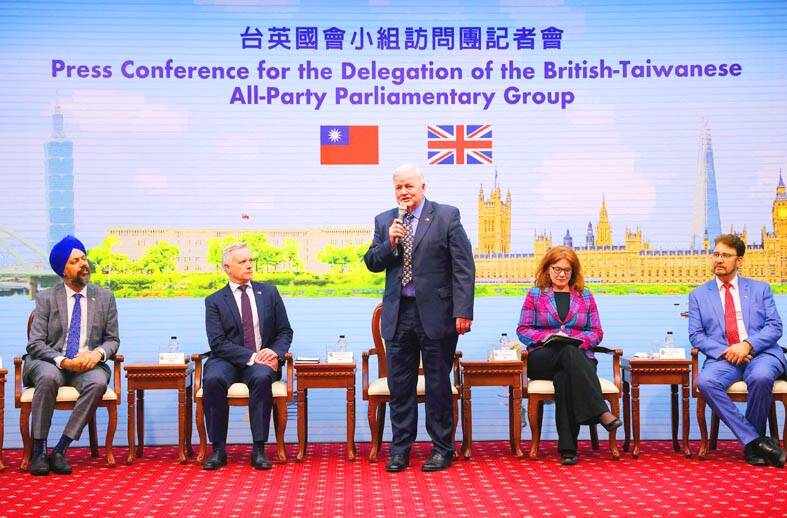Visiting German Minister of Education and Research Bettina Stark-Watzinger yesterday said that “professional exchanges” were the focus of her trip to Taiwan, not China.
Amid criticism from Beijing, the minister told reporters in Taipei that her visit was in line with Berlin’s China policy, adding that she expected it to be “transparent and professional with no surprises.”
Stark-Watzinger said she had consulted German Chancellor Olaf Scholz and the nation’s foreign minister before her visit.

Photo: AP
“Our focus is professional exchanges and the issue of China is not the topic here,” she said.
The first German federal minister to visit Taipei since 1997 said that while such trips could become “routine,” the decision on whether to travel to Taiwan would be for individual ministers to decide.
Germany and Taiwan face similar challenges with regard to a brain drain in the semiconductor field, she said, adding that regular exchanges with a partner that shares the same values of democracy and the rule of law are a must.

Photo: Annabelle Chih, Reuters
Stark-Watzinger’s 14-member delegation earlier yesterday met with Minister of Education Pan Wen-chung (潘文忠) to exchange views on Chinese-language education and academic semiconductor institutions.
The two discussed cooperation in Chinese-language education, including inviting German officials to Taiwan for language training and subsidizing Taiwanese teachers’ stay in Germany, the Ministry of Education said.
On Tuesday, Chinese Ministry of Foreign Affairs spokesman Wang Wenbin (汪文斌) expressed Beijing’s “strong disapproval” of Stark-Watzinger’s “reprehensible” act of visiting Taipei.
“We call on the German side to respect the ‘one China’ principle, immediately stop interacting and sending the wrong signals to the ‘Taiwan independence’ separatist forces,” Wang said.
German Minister of Finance Christian Lindner yesterday wrote on Twitter that the creeping loss of democracy and freedom worldwide must not be the price for cooperating with China.
That is why Stark-Watzinger’s engagement on the issue deserves respect, he wrote, with a link to an announcement about the opening of the Friedrich Naumann Foundation for Freedom’s hub in Taipei.
Separately yesterday, visiting British lawmaker Bob Stewart said that the UK should provide Taiwan with as much help as possible to defend itself.
Speaking at a news conference in Taipei, the cochair of the British-Taiwanese All-Party Parliamentary Group confirmed that issues related to the UK providing Taiwan with equipment for its indigenous defense submarine program were covered when they met with National Security Council Secretary-General Wellington Koo (顧立雄).
“It came up, in part,” Stewart said.
Stewart would not reveal details of the conversation, but said the message the delegation would take back to the British parliament is that “we should assist Taiwan in its defense as much as possible.”
Reuters published a report on Monday last week saying that the value of licenses the British government granted to companies for the export of submarine-
related components and technology to Taiwan totaled a record £167 million (US$205 million) during the first nine months of last year, more than the previous six years combined.
Asked about the report, Stewart said he “fully supports the idea.”
He did not elaborate, saying he is not part of the government.
In his opening remarks, Stewart praised Taiwan for its democratic development.
“What you have achieved in this country over 30 years is nothing more than miraculous, 30 years and you are now rated higher in democratic values than a country like my own which has had 800 years and still we can’t get it right,” he said.
The six-member British parliamentary group he is leading arrived in Taiwan on Sunday for a six-day visit.
Additional reporting by Reuters

A Ministry of Foreign Affairs official yesterday said that a delegation that visited China for an APEC meeting did not receive any kind of treatment that downgraded Taiwan’s sovereignty. Department of International Organizations Director-General Jonathan Sun (孫儉元) said that he and a group of ministry officials visited Shenzhen, China, to attend the APEC Informal Senior Officials’ Meeting last month. The trip went “smoothly and safely” for all Taiwanese delegates, as the Chinese side arranged the trip in accordance with long-standing practices, Sun said at the ministry’s weekly briefing. The Taiwanese group did not encounter any political suppression, he said. Sun made the remarks when

The Taiwanese passport ranked 33rd in a global listing of passports by convenience this month, rising three places from last month’s ranking, but matching its position in January last year. The Henley Passport Index, an international ranking of passports by the number of designations its holder can travel to without a visa, showed that the Taiwan passport enables holders to travel to 139 countries and territories without a visa. Singapore’s passport was ranked the most powerful with visa-free access to 192 destinations out of 227, according to the index published on Tuesday by UK-based migration investment consultancy firm Henley and Partners. Japan’s and

BROAD AGREEMENT: The two are nearing a trade deal to reduce Taiwan’s tariff to 15% and a commitment for TSMC to build five more fabs, a ‘New York Times’ report said Taiwan and the US have reached a broad consensus on a trade deal, the Executive Yuan’s Office of Trade Negotiations said yesterday, after a report said that Washington is set to reduce Taiwan’s tariff rate to 15 percent. The New York Times on Monday reported that the two nations are nearing a trade deal to reduce Taiwan’s tariff rate to 15 percent and commit Taiwan Semiconductor Manufacturing Co (TSMC, 台積電) to building at least five more facilities in the US. “The agreement, which has been under negotiation for months, is being legally scrubbed and could be announced this month,” the paper said,

MIXED SOURCING: While Taiwan is expanding domestic production, it also sources munitions overseas, as some, like M855 rounds, are cheaper than locally made ones Taiwan and the US plan to jointly produce 155mm artillery shells, as the munition is in high demand due to the Ukraine-Russia war and should be useful in Taiwan’s self-defense, Armaments Bureau Director-General Lieutenant General Lin Wen-hsiang (林文祥) told lawmakers in Taipei yesterday. Lin was responding to questions about Taiwan’s partnership with allies in producing munitions at a meeting of the legislature’s Foreign Affairs and National Defense Committee. Given the intense demand for 155mm artillery shells in Ukraine’s defense against the Russian invasion, and in light of Taiwan’s own defensive needs, Taipei and Washington plan to jointly produce 155mm shells, said Lin,